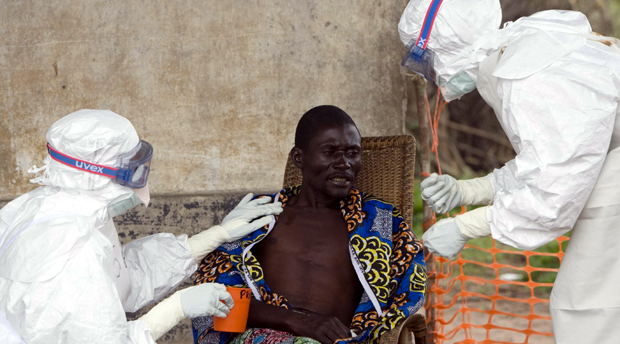Why isn’t there a treatment or vaccine for Ebola?

In this Saturday, Sept. 29, 2007, file photo, A 43 year old Congolese patient, center, who has been confirmed to have Ebola hemorrhagic fever, following laboratory tests, is comforted by Medecins Sans Frontieres (Doctors without Borders) nurse Isabel Grovas, left, and Doctor Hilde Declerck, right, in Kampungu, Kasai Occidental province, Congo. AP Photo/WHO, Christopher Black
LONDON — In the four decades since the Ebola virus was first identified in Africa, treatment hasn’t changed much. There are no licensed drugs or vaccines for the deadly disease.
Some are being developed, but none have been rigorously tested in humans. One experimental treatment, though, was tried this week in an American aid worker sick with Ebola, according to the U.S-based group that she works for in Liberia.
Without a specific treatment, doctors and nurses focus on easing the disease’s symptoms — fever, headache, vomiting and diarrhea — and on keeping patients hydrated and comfortable.
The outbreak in three West African countries — Liberia, Guinea and Sierra Leone — has sickened more than 1,300 people and more than 700 have died since March.
WHY ISN’T THERE A TREATMENT BY NOW?
Article continues after this advertisementFor one thing, the Ebola virus is hard to work with. The virus doesn’t grow well in petri dishes and experiments can only be done in the relatively few labs with the highest security measures.
Article continues after this advertisementAnd while Ebola is lethal, it’s rare. Outbreaks are unpredictable, giving doctors few chances to test new treatments. While the current epidemic is the largest recorded, the number of people sickened by Ebola is small compared to the number killed by other diseases like malaria or dengue. Much of the funding for Ebola research is from governments that worry about the virus being used in a bioterror attack.
“It’s not economically viable for any company to do this kind of research because they have stockholders to think about,” said Ben Neuman, a virologist at the University of Reading in Britain.
WHAT’S IN THE PIPELINE?
There are about a half dozen Ebola drugs and vaccines in development, several of which have received funding from the U.S. One drug developed by the U.S. Army has shown promising results when tested in monkeys.
“We think this may work because of the animal models but until you do the studies in humans, you just don’t know,” said Fred Hayden, an infectious diseases specialist at the University of Virginia, who was not involved in the research.
While animal studies for vaccine candidates have been encouraging, it’s unclear what dose humans would need.
A Canadian company, Tekmira, has a $140 million contract with the U.S. government to develop a Ebola vaccine. An early test of the shot in healthy humans was stopped recently after the Food and Drug Administration asked for more safety information.
SHOULD EXPERIMENTAL DRUGS BE USED NOW?
Scientists are split on whether or not it is a good idea to try experimental drugs and vaccines before they are approved but the prospect is being informally discussed.
“Given the prolonged and unprecedented nature of the epidemic, we need to carefully consider this,” said Dr. Peter Piot, the co-discoverer of Ebola in 1976 and director of the London School of Hygiene and Tropical Medicine.
The World Health Organization has no plans to facilitate any clinical trials during this outbreak, spokesman Gregory Hartl said.
Other experts say it’s unethical to use treatments or vaccines that haven’t been properly tested, and warn the results could be disastrous.
“None of these drugs or vaccines are ready to be used in humans from a legal point of view,” said Dr. Heinz Feldmann, chief of virology at the U.S. National Institute of Allergy and Infectious Diseases.
It would be impossible to vaccinate or treat everyone in the region but if any tests do proceed, they would probably be focused on those at highest risk: health care workers.
The American woman who got the experimental drug in Liberia worked at a hospital where Ebola patients were treated. It’s not known what kind of treatment she received.
If health care workers are treated, “We will have to explain why some people are getting the vaccine and others are not,” Feldmann said, adding there are still vast areas of West African communities suspicious of Western aid workers and their treatments. “At the moment, it doesn’t even look like the local population wants it.”
RELATED STORIES
https://newsinfo.inquirer.net/
https://newsinfo.inquirer.net/
https://newsinfo.inquirer.net/